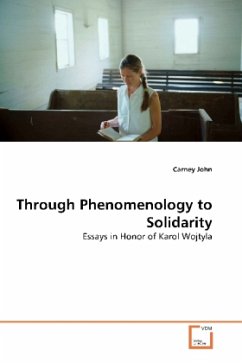This book explores the relationship between phenomenology and solidarity through a study of the major themes and authors in the phenomenological tradition. The book begins by looking at the historical and philosophical roots of solidarity. Here, the key question entails the telos of solidarity and asks: How has the scope of what one is in solidarity with changed through time? A related question to that of the scope of solidarity involves the depth of solidarity. On this topic, the book begins an inquiry into Sartre's early concept of intentionality wherein he reverses the standard account of human dependency. What emerges from this inquiry is the suggestion that solidarity stands opposed to the marked tendency of social and political structures to negate solidarity. There is also however, the problem of social evil and here the book looks to the Book of Job from the Old Testament in order to consider the the ways in which solidarity might be undermined by the very structure of one's social being. The book looks at the reflections on this relationship of Camus and in particular his work, "The Plague.
Bitte wählen Sie Ihr Anliegen aus.
Rechnungen
Retourenschein anfordern
Bestellstatus
Storno








